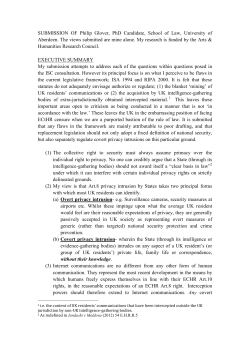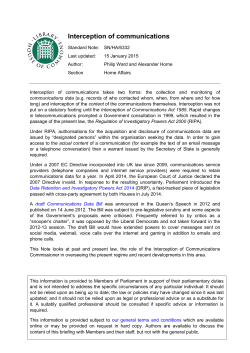
Y AR I OVERSEEING INTERCEPTION OF
COMMENTARY OVERSEEING INTERCEPTION OF COMMUNICATIONS - DID WE JUST HIT THE WRONG BUTTON? analyticamk.org OCTOBER 2014 I nterviews provided by opposition leaders usually evoke attention in the public – citizens are interested in hearing different views on policies and solutions for their problems. However, the recent interview of the biggest opposition party (SDSM) leader Mr. Zoran Zaev for the TV magazine “Win Win”1 took different flow. Namely, Mr. Zaev claimed to be a subject of application of special investigative measure – intercepting communications. In other words, his phone was allegedly wiretapped. Only few media reported on it while the state public prosecutor shortly stated that the state institutions can not comment whether there is current usage of such measures towards concrete person.2 1 News Channel, 24 Vesti, 02.10.201 2 Има ли бубачки во телефонот на Заев?, Utrinski, 03.10.2014 Special investigative measures are implemented in secrecy so one can not speculate about their usage in a concrete case without having the necessary information. However, some special investigative measures are more intrusive than the others which open the debate on their control and oversight. Interception of communications is among those measures that could pose serious threat to the human rights and freedoms of citizens, including: limiting the privacy of correspondence, inviolability of the home, personal and family life, protection and confidentiality of personal data and dignity of the person. In the same time, it is the most frequently used along with the measure “secret monitoring, following, audio and visual recording of persons and items with technical means”.3 Taking into consideration the secret nature of the special investigative measures and the confidentiality of the procedure, the public is excluded from overseeing their application. Therefore, account should be especially given to the role of the controlling and oversight bodies, including the role of the Parliament and the judiciary. The task of overseeing the application of intercepting of communications is assigned to an adequate Parliamentary committee. In time when the oppositional parties reject to participate in the work of the Parliament, the Committee could not be formed and become operational. However, the issue of parliamentary oversight is more complex and can not be resolved only with establishing the Committee in its full composition. The track record of this Committee in the previous mandate is not impressive. The Law on interception of communications was amended in 2012 broadening the mandate of the Committee so it could oversee not only the Ministry of Interior and the Ministry of Defense but also the Financial Police and Customs Administration; and also regulating that the Committee adopts the decision with the votes of the majority (meaning that the opposition has the votes). However, the Committee met only once in 2013 to discuss the annual report for its work in the previous 2012 year. Previously, in 2012, the Committee members convened four times, mainly related to discussing legislation. Apart from the challenges that the MPs are facing when performing oversight of the security sector (lack of expertise, lack of staff and financial means, non-cooperation with the executive branch etc.), the lack of political will is also hindering their work. What is more, it seems that the MPs are not convinced that they could perform such oversight, although they have the tools including security clearance to access classified documents. Mr. Pavle Trajanov, MP and former Minister of Interior, for a media article4 stated: There is no real control of the security services anywhere in the world. Tell me an example of a Parliament that has such control! Yes, constitutionaly and legaly many countries have established forms and mechanisms for civilian control of the work and operative measures of the security services, but in practice, such control is little or not implemented at all. Especially in the segment of endangering human rights in case of implementation of measures such as surveillance and wiretapping. Hence, I believe that the control is reduced to being democratic décor. Mr. Trajanov was a deputy member of the Committee overseeing application of the interception of 3 Annual report of the Public Prosecution of Macedonia for 2010, 2011 and 2012 4 Контролата врз прислушкувањето еднаква на – нула!!! , DW, 13.10.2014 communications in the previous two mandates (2008 – 2011 and 2011-2014). Taking into consideration his education and professional background, he is among the most qualified MPs to conduct oversight of application of special investigative measures. The situation where competent MPs believe the civilian oversight is “a democratic décor” (but still take part in it) does not bring optimism about the accountability of the services. There is little understanding that overseeing collection of intelligence is not a privilege for the MPs, but a responsibility towards the citizens they represent. Furthermore, the current legislative solution regulates that the control of the application of the measure intercepting of communications is performed by the competent public prosecutor. Moreover, the provisions saying that the measure could be applied only upon court order should guarantee judicial control. Even the Constitution regulates that “only a court decision may authorize non-application of the principle of the inviolability of the confidentiality of correspondence and other forms of communication, in cases where it is indispensable to a criminal investigation or required in the interests of the defense of the Republic” (article 17). Unfortunately, the recent Progress report by the European Commission on Republic of Macedonia for 2014 sheds another light on the issue. Namely, one of the biggest drawbacks hampering the country’s progress is the judicial reform. It says: “One of the main challenges is the growing concern voiced about the selectivity of, and influence over, law enforcement and the judiciary.” Speaking about possible political influence, the Progress report highlights the need for correct implementation of European standards relating to independence. It seems that Macedonia has not found a model to ensure lawful application of the interception of communications. Experiences from other countries show that there is no single model that could guarantee proper oversight and control. Various models include specialized parliamentary committees with or without investigative powers, specialized bodies for handling complaints by the citizens or expert bodies performing independent oversight and/or control. Each model has its own advantages and disadvantages, but the most important is existence of political will, strict regulation and independence in its operation. Design by Muhsin Güler Written by: Magdalena Lembovska, Research Fellow on the Foreign and Security Policy Programme mlembovska@analyticamk.org / Analytica Thinking Laboratory / analyticamk.org
© Copyright 2025















